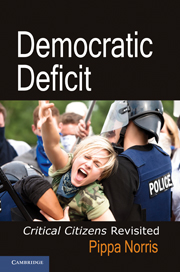Book contents
- Frontmatter
- Contents
- List of Tables
- List of Figures
- Preface and Acknowledgments
- PART I INTRODUCTION
- PART II SYMPTOMS
- PART III DIAGNOSIS
- 7 Rising Aspirations?
- 8 Democratic Knowledge
- 9 Negative News
- 10 Failing Performance?
- PART IV PROGNOSIS
- 12 Conclusions and Implications
- Technical Appendix A Concepts and Measures
- Technical Appendix B Countries in the Pooled World Values Survey, 1981–2007
- Technical Appendix C Methods
- Notes
- Selected Bibliography
- Index
8 - Democratic Knowledge
Published online by Cambridge University Press: 05 June 2012
- Frontmatter
- Contents
- List of Tables
- List of Figures
- Preface and Acknowledgments
- PART I INTRODUCTION
- PART II SYMPTOMS
- PART III DIAGNOSIS
- 7 Rising Aspirations?
- 8 Democratic Knowledge
- 9 Negative News
- 10 Failing Performance?
- PART IV PROGNOSIS
- 12 Conclusions and Implications
- Technical Appendix A Concepts and Measures
- Technical Appendix B Countries in the Pooled World Values Survey, 1981–2007
- Technical Appendix C Methods
- Notes
- Selected Bibliography
- Index
Summary
Previous chapters have demonstrated that overt support for democracy as an ideal form of governance proves almost universal today; almost nine out of ten respondents in the WVS survey approved of democratic governance as either a ‘very’ or ‘fairly’ good political system for their own country. The majority of citizens in every country under comparison say they wish to live in a democracy. These sentiments are not restricted by levels of development or the type of regime in power. If taken at face value, this worldwide pattern could be celebrated as indicating popular aspirations for democracy, indeed possibly signaling the end of normative debate about the best type of governance. If attitudes shape actions, then these sentiments have the potential to fuel enthusiasm for mass reform movements in Western nations as well as strengthening the legitimacy of fragile democracies and catalyzing ‘people power’ street protests, opposition uprisings, and dissident movements challenging repressive autocracies, such as those in Iran and Kyrgyzstan. The ubiquity of democratic aspirations cannot be dismissed as simply a technical artifact of the World Values Survey research methods or measurement error; similar findings have been widely reported by many other studies.
Yet it would be unwise to treat the meaning of the survey evidence as straightforward and unproblematic without first establishing what people in diverse cultures understand when they express the desire for democracy as an ideal principle or when they approve of the performance of democratic governance in their own country.
- Type
- Chapter
- Information
- Democratic DeficitCritical Citizens Revisited, pp. 142 - 168Publisher: Cambridge University PressPrint publication year: 2011



